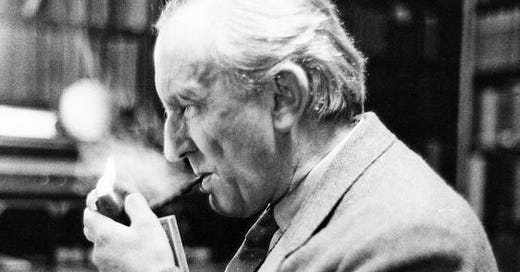How J.R.R. Tolkien Responded to the Bombing of Nagasaki
President Truman’s decision to use atomic bombs on Japan remains one of the most hotly-debated ethical questions in history.
On Aug. 9, 1945, the day the U.S. dropped a second atomic bomb—this one on the Japanese city of Nagasaki—J.R.R. Tolkien penned a letter to his son, Christopher Tolkien. Here is what he wrote:
“The news today about ‘Atomic bombs’ is so horrifying one is stunned. The utter folly of these lunatic physicists to consent to do such work for war-purposes: calmly plotting the destruction of the world! Such explosives in men’s hands, while their moral and intellectual status is declining, is about as useful as giving out firearms to all inmates of a gaol and then saying that you hope ‘this will ensure peace’. But one good thing may arise out of it, I suppose, if the write-ups are not overheated: Japan ought to cave in. Well we’re in God’s hands. But He does not look kindly on Babel-builders.”
It’s worth observing that many of the most vociferous objections to the dropping of the atomic bomb initially came from conservative voices, among them William F. Buckley, Russell Kirk, Medford Evans, and Richard Weaver.
What strikes me is that Tolkien’s immediate reaction was not to rejoice that the bloody “War of Machines,” as he often referred to it, was finally over; he expressed horror that man had created such an instrument.
Tolkien’s fear—not an unreasonable one, in my opinion—seems to stem from the idea that humans could not contain such technology, that it would one day fall into evil or imprudent hands, which might very well spell the doom of mankind.
One wonders if Tolkien would be surprised to learn that, in the year 2024, humans had not only not destroyed themselves, but not a single nuclear weapon had been dropped on a population since the day he wrote that letter to his son.
I must admit that I’ve long believed that it is a question of when, not if, a third nuclear bomb will be dropped in warfare. Like Tolkien, I harbor grave doubts that such power can indefinitely be contained. I pray I am wrong.
President Truman’s decision to use the bomb remains one of the most hotly-debated ethical questions in history. I don’t judge Truman for making the choice he did. The ethics are complicated, even for those of us who are not operating in the fog of war.
For years I defended the use of the first bomb (not the second), but I’ve since changed my view and find myself in general agreement with General Dwight D. Eisenhower.
“I was against (use of the atomic bomb) on two counts,” Ike wrote. “First, the Japanese were ready to surrender and it wasn’t necessary to hit them with that awful thing. Second, I hated to see our country be the first to use such a weapon.”
In any event, Tolkien was correct that the bomb would shatter Japan’s already crumbling resolve to continue fighting.
We’d also do well to remember last line: “[God] does not look kindly on Babel-builders.”





Jon, I have to say that what was not included in this article was the fact that Truman was a radicle racist who called the Japanese monkeys and the reason the bombs were dropped was to test them on an actual civilian population, frighten the Russians. The war was in effect over, and the Japanese just wanted to retain their Emperor. The US said no because they planned to use the bombs for the reasons mentioned above and as it turned out they were allowed to keep the emperor after all. This was an inhuman act of brutality that is unmatched, and we call ourselves civilized. This is not hotly debated as the truth is known. Did you know that US prisoners were sacrificed for this? Did you know the only Christien church was used as an aid for targeting? Like Albright stated, "Yes I think the price of murdering half a million Iraci children was worth the price." My God what a telling statement this was. I think you may have some reading to do.
This may be an article on Tolkien, but when I was reading it, The Magician's Nephew by C.S. Lewis came flooding back to me. I've long believed that The Deplorable Word, which Jadis used to destroy Charn, was something of an allegory of what could happen when humans could no longer contain themselves on using something as destructive as a nuclear weapon. Maybe I'm wrong on all accounts, but that was my takeaway.